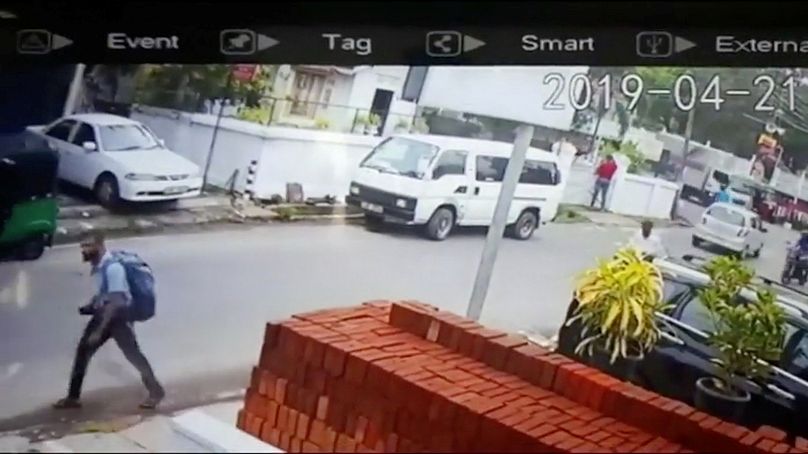Investigations have confirmed there were nine suicide bombers and that eight have been identified, police said.
Easter Sunday bombings in Sri Lanka killed at least 359 and injured as many as 500, police said on Wednesday.
 ADVERTISEMENT
ADVERTISEMENT
 ADVERTISEMENT
ADVERTISEMENT
The near-simultaneous blasts targeted three churches full of people for Easter services and three major hotels in the country's capital, Colombo.
Investigations have confirmed there were nine suicide bombers and that eight have been identified, police said.
Over 60 people have been arrested since Sunday, according to the leader of the country's parliament.
More information is emerging on who was behind the attacks. Here's what we know so far:
What clues do we have about the bombers' identities?
CCTV footage released by the Sri Lankan government, according to Reuters, shows a man with a rucksack entering St Sebastian's Church in Negombo moments before a deadly blast.
The footage has been getting a lot of attention as various media organisations are linking the man to involvement in the attack, however, Euronews currently has had no confirmation of that from Sri Lankan police. There is also no official verification of the man's identity.
Watch: CCTV shows man with rucksack entering Sri Lankan church before explosion
Prime Minister Ranil Wickremesinghe told a press conference on Tuesday that the person depicted in the video "is suspected to be one of the suicide bombers, they (investigators) have to confirm it".
One of the bombers studied in both the UK and Australia, the defence minister said on Wednesday.
“We believe that one of the suicide bombers studied in the UK and later did his postgraduate [studies] in Australia before coming back and settling in Sri Lanka,” said Ruwan Wijewardene.
He added that many of the suspects had international links due to living or studying abroad.
The BBC named the bomber who had visited the UK as Abdul Latif Jamil Mohammed. Reached by Euronews, the British Home Office declined to comment.
Wijewardene also told reporters that one of the nine bombers that detonated explosives was a woman.
'Well-educated and middle class'
Wijewardene also said: “This group of suicide bombers, most of them are well-educated and come from middle or upper-middle class, so they are financially quite independent and their families are quite stable financially, that is a worrying factor in this,” he said.
“Some of them have I think studied in various other countries, they hold degrees, LLMs [Masters degrees in law], they’re quite well-educated people.”
**Sri Lankan authorities have not released the identities of any of the bombers but several attackers were named in local and international media.
**
**According to Reuters, Inshaf and Ilham Ibrahim, two brothers from a wealthy family, were among the attackers. **
Inshaf Ibrahim, a 33-year-old copper factory owner, detonated his explosive device at the busy breakfast buffet of the luxury Shangri-La hotel, a source close to the family said.
When police went later that day to raid the family home, his younger brother Ilham Ibrahim detonated a bomb that killed him, his wife and the couple's three children, the source told Reuters, requesting anonymity for fear of reprisals.
The brother's father, spice trader Mohamed Ibrahim, was arrested as police investigate those behind the attacks, police said.
Did they have outside help?
The so-called Islamic State (IS) on Tuesday claimed responsibility for Sunday’s deadly attacks Sri Lanka but did not back its claim up with any evidence.
The government has blamed the National Thowheed Jamath (NTJ), an Islamist movement, for the attacks but Prime Minister Ranil Wickremesinghe said there may be "some links" with IS as the training and coordination displayed in the multi-layer attack showed there "seems to have been foreign involvement."
READ MORE: Sri Lanka bombings: officials deliberately hid intelligence, says minister
He added that the government's security agencies were monitoring Sri Lankans who had joined IS and returned home.
Some suspects still on the run
Wickremesinghe also said after a journalist pressed him on the matter, that some suspects were still on the run and that some might have explosives.
He added that the police had searched some "safehouses" but would not confirm where they were. "They won't be in the cities," the premier said.
What was their motive?
Defence Minister Ruwan Wijewardene told a parliament on Tuesday that the explosions were "retaliation" against the March 15 attack on two mosques in New Zealand but did not provide any evidence. Police have not confirmed this.
New Zealand's Prime Minister Jacinda Ardern said in response that her government was not aware of any intelligence suggesting the blasts were in retaliation to deadly shootings on mosques in Christchurch.
"I absolutely understand though, Sri Lanka will be in the very early stages of its investigations," she said.
"So we are simply stepping back and allowing them to undertake those, but again as we say we have nothing at this stage to corroborate what is being said."











